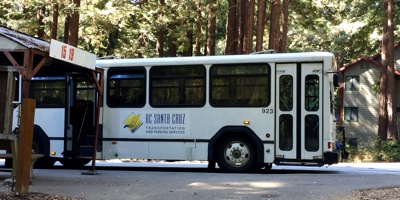By switching to renewable diesel fuel, UC Santa Cruz has significantly reduced the amount of carbon emitted from its student shuttles and other fleet vehicles.
Campus vehicles used about 72,000 gallons of diesel in 2019, fleet manager Theo Diamantopoulos said. He estimated the switch to renewable biodiesel—which is synthetically generated—reduced UCSC’s annual fleet CO2 emissions by 25 percent percent over the past year.
“You can tell the difference in clarity,” Diamantopoulos said. “It burns cleaner and you can even smell the difference if you’re near a bus.”
The move to 100 percent biodiesel in February 2019 reflects a campuswide commitment to reducing UC Santa Cruz’s impact on the environment and carefully stewarding the world’s natural resources.
UC Santa Cruz began considering moving to biodiesel after hearing that UC San Diego and UC Davis successfully moved to the renewable fuel. UC Santa Cruz switched to biodiesel in February and any vehicles that relied on regular diesel are now using biodiesel. On average, biodiesel costs the same or a bit less, he said.
The long-term goal is to move to an all-electric fleet of vehicles, Diamantopoulos said, though it will require a significant financial investment. Renewable diesel represents a way to do something tangible now, while the campus works toward even more sustainable options.



